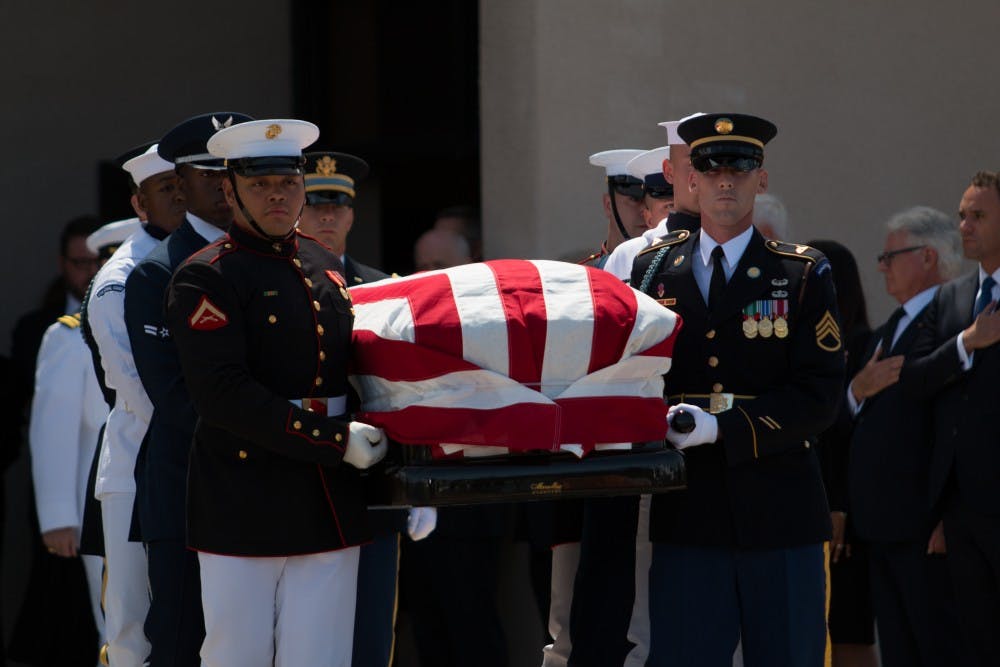Arizona gave the late Sen. John McCain one last farewell Thursday after a week of memorials — both planned and impromptu — that brought together thousands of mourners, politicians and friends of the late senator.
See More: ASU students and staff mourn the loss of Sen. John McCain at Arizona State Capitol
Dignitaries, politicians, family, friends — including ASU President Michael Crow — and about 1,000 members of the public packed the North Phoenix Baptist Church Thursday morning, with some lining up as early as 7 a.m. to pay their respects to the longstanding Republican senator.
The crowd filled the church with a smattering of laughter, sobs and most deafeningly, a silence that filled much of the two hour ceremony.
The silence was broken by former Vice President Joe Biden, who spoke emotionally about the toll his longtime friend's death had on him.
“There are times when life can be so cruel and the pain so blinding,” Biden said as he looked down at the McCain family in the first row. “And it's hard to see anything else.”
McCain died Aug. 25 following a year-long fight with glioblastoma, a "difficult to treat" brain cancer, according to Mayo Clinic.
Bipartisanship was a recurring theme throughout the service. Biden said it was a scornful concept that bipartisanship is seen as a rarity in modern politics and is not simply expected of everyone.
“It wasn’t about politics with John (McCain). He could disagree on substance, but the underlying values that animated everything John did, everything he was, come to a different conclusion."
Biden, a Democrat, recalled serving in the legislature with McCain in 1996 when party leaders told both senators that they should not be seen sitting with each other since they were from different parties. Biden said this was a time when “things started to change for worse in America.”
“All we do today is attack the oppositions of both parties, their motives, not the substance of their argument. This is the mid-90s. It began to go downhill from there," Biden said. "The last day John was on the Senate floor... he was fighting to restore what you call regular order, just start to treat one another again, like we used to."
Among the crowd was another friend of McCain, ASU President Michael Crow.
“I’ve known John McCain for over 20 years, and we have a strong working and personal relationship,” Crow said. “We are both deeply committed to the success of the country and all of the things we worked on, including the ones at ASU.”
Crow recalled the last time he spoke to McCain, just weeks before his death.
“He and I talked about those things that he wanted to make sure got done after he died,” Crow said. “And those were projects related to the betterment of Phoenix, the betterment of the United States and, in particular, maintain access and the evolution of the University to students from every family and background.”
McCain had endorsed or aided multiple projects at ASU, including the Rio Salado Project 2.0, which seeks to reinvigorate dry riverbeds across the Valley with the help of the University.
See More: Sen. John McCain details Valley-wide lake project at ASU
Crow lauded McCain as “a man dedicated to the success of the country and not dedicated to his own success … a man dedicated to working with others and arguing hard to make things happen rather than just arguing to argue.”
Larry Fitzgerald, a wide-receiver for the Arizona Cardinals, contrasted himself to McCain and highlighted the unusual friendship between the Senator and himself.
“While some might find our friendship out of the ordinary, it was a perfect example of what made him an iconic figure of American politics in service to fellow man,” Fitzgerald said. “He celebrated differences, he embraced humanity, championing what was true and just and saw people for who they were.”
Fitzgerald echoed the sentiments of the other speakers in saying that McCain's independent spirit was selfless and indicative of the type of person he really was.
“A man (who) at times, just as he sacrificed himself for his fellow POWs in Vietnam, willfully chose to sacrifice his own political gain in order to accomplish what he believed was best for all of us," Fitzgerald said. "He may have lost the support of a political ally here or there, but he gained the respect and admiration of an entire nation.”
Throughout the event, there were several references to the final letter McCain wrote to the nation just before his death. In the letter, McCain wrote that "(Americans) weaken our greatness when we confuse our patriotism with tribal rivalries that have sown resentment and hatred and violence in all the corners of the globe."
McCain will be buried on Sunday, Sept. 2 at the U.S. Naval Academy Cemetery in Annapolis, Maryland following a lying in state at the U.S. Capitol.
Reach the reporter at isaac.windes@asu.edu or follow @isaacdwindes on Twitter.
Like The State Press on Facebook and follow @statepress on Twitter.




